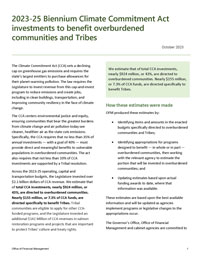43% of CCA investments are directed to overburdened communities, according to OFM estimates
The Climate Commitment Act (CCA) sets a declining cap on greenhouse gas emissions and requires the state’s largest emitters to purchase allowances for their planet-warming pollution. The law requires the Legislature to invest revenue from this cap-and-invest program to reduce emissions and create jobs, including in clean buildings, transportation, and improving community resiliency in the face of climate change.
The CCA centers environmental justice and equity, ensuring communities that bear the greatest burdens from climate change and air pollution today see cleaner, healthier air as the state cuts emissions. Specifically, the CCA requires that no less than 35% of annual investments — with a goal of 40% — must provide direct and meaningful benefits to vulnerable populations in overburdened communities. The act also requires that not less than 10% of CCA investments are supported by a Tribal resolution.
 Across the 2023-25 operating, capital and transportation budgets, the Legislature invested over $2.1 billion dollars of CCA revenue. We estimate that of total CCA investments, nearly $924 million, or 43%, are directed to overburdened communities. Nearly $155 million, or 7.3% of CCA funds, are directed specifically to benefit Tribes. Tribal communities are eligible to apply for other CCA-funded programs, and the Legislature invested an additional $142 Million of CCA revenues in salmon restoration programs and projects that are important to protect Tribes' culture and treaty rights.
Across the 2023-25 operating, capital and transportation budgets, the Legislature invested over $2.1 billion dollars of CCA revenue. We estimate that of total CCA investments, nearly $924 million, or 43%, are directed to overburdened communities. Nearly $155 million, or 7.3% of CCA funds, are directed specifically to benefit Tribes. Tribal communities are eligible to apply for other CCA-funded programs, and the Legislature invested an additional $142 Million of CCA revenues in salmon restoration programs and projects that are important to protect Tribes' culture and treaty rights.
The Climate Commitment Act (CCA) sets a declining cap on greenhouse gas emissions and requires the state’s largest emitters to purchase allowances for their planet-warming pollution. The law requires the Legislature to invest revenue from this cap-and-invest program to reduce emissions and create jobs, including in clean buildings, transportation, and improving community resiliency in the face of climate change.
The CCA centers environmental justice and equity, ensuring communities that bear the greatest burdens from climate change and air pollution today see cleaner, healthier air as the state cuts emissions. Specifically, the CCA requires that no less than 35% of annual investments — with a goal of 40% — must provide direct and meaningful benefits to vulnerable populations in overburdened communities. The act also requires that not less than 10% of CCA investments are supported by a Tribal resolution.
Across the 2023-25 operating, capital and transportation budgets, the Legislature invested over $2.1 billion dollars of CCA revenue. We estimate that of total CCA investments, nearly $924 million, or 43%, are directed to overburdened communities. Nearly $155 million, or 7.3% of CCA funds, are directed specifically to benefit Tribes. Tribal communities are eligible to apply for other CCA-funded programs, and the Legislature invested an additional $142 Million of CCA revenues in salmon restoration programs and projects that are important to protect Tribes' culture and treaty rights.
To read more about how these estimates were made and see a full accounting of CCA investments to benefit overburdened communites and Tribes, see our factsheet:


